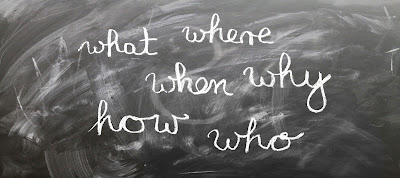One of the biggest challenges I come across when helping people out in their genealogy research is trying to decipher what kind of help someone is asking for when they have a genealogy conundrum. This happens in the genealogy related groups I participate in on Facebook and also in the various in-person drop-in meetings with fellow researchers.
Also, it isn't just the questions being asked that are sometimes a challenge but also in the answers provided by those kind hearted souls who have taken the time to respond.
The Question
Asking a good question actually brings us back to our days in school when we were (hopefully) taught the five "W"s: Who, What, When, Where, and Why. Having you question cover the 5 "W"s, especially when it comes to asking a research question about a person or event, really helps those willing and able to answer what is being posed.
Who
Who are you looking for? I don't mean the relationship or nickname used by the family such as "I'm looking for the parents of grandmother Sippy?" but the actual name of the person. If it is a woman, consider providing both her maiden and married surname(s).
What
What are you looking for that the group or individual might be able to help you discover. This is where it is important to be specific. Asking for "I'm looking for information about John Smith?" isn't generally going to get you much help. However, "I'm looking for an obituary or death notice for John Smith who died around Aug 10, 1950 in Toronto, does anyone know where I should look?" will probably get you a few leads and even possibly a specific answer.
When
No, not "I need it now" but what is the time period the event took place. If a date or range of dates isn't provided the first question asked back is often "For when?" Depending on the time period the records can be held in different jurisdictions or may be in a different format than expected. A petition for land in Upper Canada might actually be found in the
collections for Lower Canada if we go back far enough. It could also be that a law came into effect on a certain date and before that date you have to be a bit more creative in what records are examined.
Where
The where, much like the when, is a critical piece of information to provide in your question. As you dig deeper into your research you quickly find that borders and jurisdictions change more often than we realized. We find this challenge with changing borders everywhere in our research. It is also why best practice is to record the place of the event with the place name used then and not now.
Why
The why isn't always necessary but it can help others understand the reason you are looking for the information. Stating "I'm working on my Mayflower descendant application and I'm looking for assistance in connecting Jonathan Starr to his son Samuel who married Ann Bushell" might attract the attention of those who have worked on similar lineage society applications or those with an interest Mayflower research.
The Answer
Yet what about those answering the questions?
One of our goals when answering a question should be to educate the person asking the question. Just giving a one line answer or image (kindly respect the copyright folks!) only resolves the immediate question. If we also provide the "How" we found the answer we provide the questioner with possibly a new tool in their research tool box.
How
- Was it searching a collection on a genealogy site? What is the name of the site and collection? Did we do something special to find that record or document?
- Was it found using our favourite search engine? What were the keywords used? Did we use a lesser known feature of that search engine to find the information? If so, a line clarifying it will educate other readers of your answer. My favourite is using the ".." (double dots) on Google to look within a range of numbers like "1850..1870".
- Did you have some sort of arcane knowledge gained when doing your own genealogy research? A bit of "patting yourself on the back" for knowing and then sharing a cool fact is not necessarily a bad thing!
I will also sometimes see fairly short and terse responses, especially for questions that seemingly always pop up. I can understand the frustration of always answering the same question over and over and over again. So keep in mind that the person asking the question will probably not have hear or seen the answer before. That is why they are asking the question in the first place.
The Thank You
I know I shouldn't have to write this part but sometime, in our haste, we forget the thank you.
For the one asking the question there is one more thing to keep in mind, thank and acknowledge the person who has taken the time and trouble to help you out. When in person this is almost always automatic and a "Thank you", a nod of the head, or a smile all go a long way.
On social media like Facebook a simple "Like" is often sufficient. As someone who answers a number of questions seeing the "Like" means that my time to help you out was worth it and you appreciated my answer.
